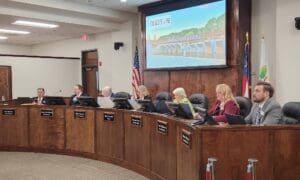City manager hoping for smoother waters as ‘team approach’ takes hold in PTC
To say that the first two-plus years on the job have been smooth sailing for Peachtree City Manager James Pennington would be a bit of a stretch.
The waters have been rocky at times. Lawsuits against the fire chief alleging sexual harassment and against the police chief alleging sexual discrimination have led to the city retraining the entire staff on such matters. New personnel policies aimed at squelching such problems have been adopted.
Infighting among council members at public meetings has also been a challenge. A fracas between the mayor and the other four council members delved into sore feelings over the mayor using city funds to defend himself in a lawsuit over comments he emailed to a city staffer.
“It’s been the hardest thing to try and keep some harmony on council and at the same time not giving up on your ethics or anything like that,” Pennington said.
Yet after two and a half years on the job, and with the potential for several new council members waiting in the wings due to the election, Pennington seems buoyed by the need to keep moving forward, particularly in implementing the team approach to all city endeavors.
One salient example was a September meeting between city staff and the Georgia Department of Transportation about traffic problems on Ga. Highway 54 West. Instead of just having the city engineer and public works department involved, there were also representatives from the police and fire departments, the planning department and even the city’s public information officer.
The result was a give-and-take that helped clarify the DOT proposal of adding a new timing system to the clogged artery.
It also was a great “team effort” from the various departments, Pennington noted.
“Annexation is another example,” Pennington said of the city’s analysis of potentially annexing land to the city’s east side along Ga. Highway 54. It takes all hands on deck to figure out how services can be delivered to new areas, Pennington noted.
The team concept is paying dividends, Pennington said, adding that “it has taken time” to get off the ground.
The city has built a significant amount of momentum in terms of improving infrastructure, as broken-down tennis courts and other run-down facilities have been repaired and gotten makeovers through a renewed emphasis among city staff and funding from a $3 million bond issue.
On the subject of city staff, Pennington notes that the city operates with a small staff of about 240 people compared to cities of similar size, and because of that nature city employees by and large are very hard working and get the job done.
“Whatever these folks do, they put their all into it,” Pennington said. “The vast majority really do great work because they are concerned about what they do and making sure it’s done right.”
Staff morale has been a problem since day one because of issues that lingered prior to his arrival, Pennington said. And while it’s a touchy subject, things are getting better in that regard though it has taken time, he said.
“The morale in the organization has been one of the hardest things for me to deal with,” Pennington said. “I had more concerns about that than with anything else. We won’t go into all the details of why, but it was there when I got here and that’s why we’re trying to change it and it’s slowly, slowly, slowly going away.”
Pennington pointed to the inclusion of staffers in a series of meetings seeking input on the city’s new personnel policy manual. Pennington attended some of the meetings in an effort to show that management wanted to listen to employees’ feedback on the changes.
“There are still some things that need to be adjusted, but I think we’re headed in the right direction,” on the personnel manual, Pennington said. “… Those employees are so important.”
Pennington specifically addressed the reorganization of the recreation and special events department, which lost several employees as the city sought to tighten its purse strings.
The change was so dramatic, not just on the personnel side, but also in switching the direction and goals of the department, Pennington said.
“There were changes to people on the outside, users, as well as the ones on the inside doing the doing,” Pennington said. “It’s pretty well coming together now.”
The good news is that that city has gotten a host of recent accolades from outside companies and agencies, much of course stemming in one way or another from the city’s unique 90-plus miles of golf cart paths.
The city can’t rest on its laurels, Pennington said. Moving forward, the city needs to continue attracting younger families and doing its best to encourage reinvestment in older neighborhoods as new residents move in, Pennington added. He cited watching the progress of several homes on his drive in to work each day as they were repainted and spruced up on the outside.
“It’s almost the reverse of the broken-glass theory,” Pennington said. “If somebody is starting to fix something up, there’s a good chance somebody else is going to do it too. That’s what we’re hoping to have happen. … We need to try to make sure we don’t have a decline and keep those property values. Redoing and fixing: how do we encourage that? It’s hard.”
City staff also needs to keep an eye on the changing nature of the community, because even as the city’s population ages, there are still young families seeking to live here, Pennington said. One big selling point, he noted, is the quality school system Fayette County offers.
“It’s important to be assisting that school system because they’re the next group that’s going to be coming along and you need to make sure they’re there,” Pennington said. “… That’s the next wave. We’ve got to continue to feed those.”










Leave a Comment
You must be logged in to post a comment.